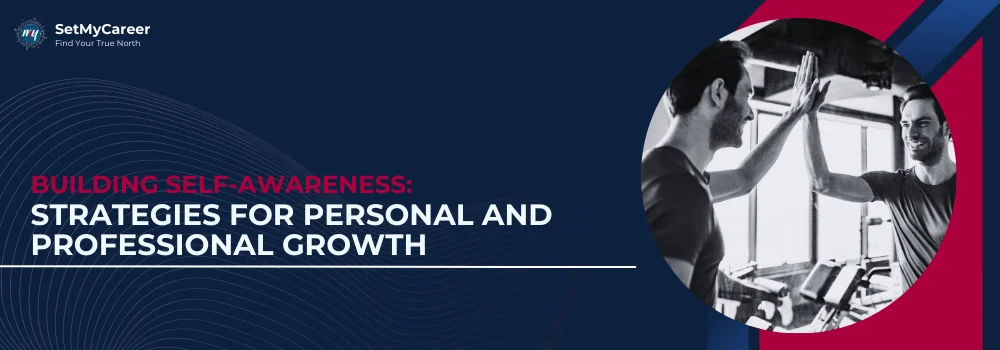Published by Jyothi Patil on 18 September 2024
Content Strategist | Editorial Team Member
Jyothi Patil is a skilled writer with a strong background in English literature, which she applies to crafting engaging content across various platforms. From writing blogs for her website and guest posts to creating pieces on Medium and Substack, Jyothi excels in making complex ideas easy to understand.
Learn how to increase self-awareness with practical strategies for both personal and professional growth.

Have you ever been at a point where you’re unsure which way to turn in your life or career? It happens to all of us. Self-awareness is like a personal GPS that helps you figure out where you are and where you need to head. It gives you a clearer picture of your strengths, weaknesses, and how you handle situations, making life’s decisions a lot easier.
When you truly understand yourself, you start to make choices that feel right, both personally and professionally. But self-awareness doesn’t just appear overnight—it’s something you can develop. Let’s explore some practical self awareness strategies to help you build this essential skill and start making more confident moves in life.
Self-awareness is the ability to deeply understand your own emotions, thoughts, and behaviors, and how they influence your interactions with others. It’s like having a personal dashboard that displays insights into what drives you, what triggers your reactions, and how you come across to those around you.
For example, if you notice that you feel overwhelmed in high-pressure situations, self-awareness helps you identify this pattern and manage your responses more effectively. You might recognize that your stress comes from a fear of failure, which allows you to address it by seeking additional support, such as psychological counselling, or by setting more realistic goals.
Overall, self-awareness is about gaining a clear, honest understanding of yourself, which helps you make better decisions, enhance your relationships, and handle life’s challenges with greater ease.
Self-awareness is a game-changer for both personal and professional growth, and it plays a key role in personality development. Here’s how it works its magic:
Mastering Your Decisions: Imagine you're at a crossroad. Self-awareness helps you figure out what environment suits you best—whether it’s a creative, fast-paced job or a steady, structured one. With this clarity, you’re more likely to make choices that truly fit who you are.
Building Stronger Connections: Knowing your own tendencies can transform your relationships. If you’re aware that your perfectionism sometimes frustrates others, you can adjust how you work with teammates or friends, making your relationships smoother and more enjoyable.
Turning Stress Into Strength: Ever wonder why some situations stress you more than others? Self-awareness helps you identify those stress triggers, like tight deadlines or lack of control, so you can manage them more effectively and keep calm under pressure.
Personal Growth: Spotting areas for self-improvement becomes easier when you know yourself well. Whether it’s improving your communication skills or working on patience, self-awareness pushes you to grow and evolve in ways that matter.
Boosting Emotional Intelligence: In emotionally charged situations, self-awareness helps you pause and reflect before reacting. This means you can handle conflicts better, respond with empathy, and maintain control of your emotions when it matters most.
By cultivating self-awareness, you open the door to personal success, stronger relationships, and the confidence to tackle life’s challenges with ease.

The better you know yourself, the further you’ll go
Grow todayReaching your full potential involves actively applying effective strategies and committing to continuous self-improvement. By embracing these practical steps, you can make substantial progress in both your personal and professional life. Here’s how to position yourself for success:
Clarify your personal and professional goals. Set SMART goals: specific, measurable, achievable, relevant, and time-bound. Example: Set a goal to improve your public speaking skills by attending a workshop and practicing regularly.
Regularly ask for feedback from peers, mentors, or supervisors to gain insights into your performance and areas for improvement. Example: Request constructive feedback from colleagues after presentations or projects to enhance your skills.
Take time to regularly reflect on your experiences, decisions, and behaviors. Journaling or meditating can help you gain deeper self-understanding. Example: Spend 10 minutes each evening reflecting on your day and noting any areas where you could improve or adjust your approach.
Keep learning by taking courses, attending workshops, or reading. Staying updated helps you adapt and grow in your career and personal life. Example: Enroll in an online course related to your field to stay current with industry trends.
Cultivate meaningful connections with others. Professional networking and maintaining positive relationships can provide support and open up new opportunities. Example: Attend industry events to meet professionals in your field and build your network.
Develop emotional intelligence by managing your emotions and understanding others. This enhances your interpersonal skills and helps in resolving conflicts effectively. Example: Practice empathy by actively listening to others and considering their perspectives in conversations.
Maintain a healthy work-life balance by managing your professional duties while making time for yourself. Set clear boundaries to avoid burnout and prioritize well-being. Example: Designate specific hours for work and leisure, and stick to them to ensure you have time for relaxation and hobbies.
Welcome challenges and see setbacks as opportunities to grow. A positive mindset encourages continuous improvement and resilience. Example: When facing a difficult task, focus on learning from the experience rather than fearing failure.
Implementing these strategies will help you achieve personal and professional growth, ensuring that you remain on a path of continuous improvement and fulfillment.
Developing self-awareness is a powerful path to personal and professional growth. Through reflection, feedback, mindfulness, goal-setting, and embracing challenges, you gain valuable insights that drive positive change. If you’re ready to elevate your self-awareness and advance your career, SetMyCareer is here to assist. Reach out to discover how we can support your journey.
No. 14/595, 1st Floor, Nanjappa Reddy Layout, Koramangala 8th Block, Bangalore 560095